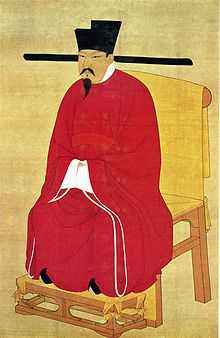Emperor Shenzong of Song
| Zhao Zhongzhen | |||||||||||||||||
|---|---|---|---|---|---|---|---|---|---|---|---|---|---|---|---|---|---|
 | |||||||||||||||||
| Reign | 25 January 1067 – 1 April 1085 | ||||||||||||||||
| Spouse |
Empress Yinshen Empress Yincheng Empress Yinzhe | ||||||||||||||||
| |||||||||||||||||
| Dynasty | Sòng (宋) | ||||||||||||||||
| Father | Emperor Yingzong of Song | ||||||||||||||||
| Mother | Gao Taotao, Empress Xian Ren Shen Li | ||||||||||||||||
| Born | 25 May 1048 | ||||||||||||||||
| Died | 1 April 1085 (aged 36) | ||||||||||||||||
Emperor Shenzong of Song (Chinese: 宋神宗; pinyin: Sòng Shénzōng; 25 May 1048 – 1 April 1085) was the sixth emperor of the Chinese Song dynasty. His personal name was Zhao Xu. He reigned from 1067 to 1085.
The era names of his reign are Xīníng (熙寧; "Peaceful Prosperity") 1068–1077, and Yuánfēng (元豐; "Primary Abundance") 1078–1085.
During his reign, Shenzong became interested in Wang Anshi's policies and appointed Wang as Chancellor. Wang implemented his famous reforms aimed at improving the situation for the peasantry and unemployed, which some have seen as a forerunner of the modern welfare state. These acts became the hallmark reform of Shenzong's reign.
Shenzong's other notable act as emperor was his attempt to weaken the formative nation of Western Xia by invading and expelling the Xia forces from Gansu. Shenzong's army was initially quite successful at these campaigns, but during the battle for the city of Yongle, in 1082, Shenzong's forces were defeated. As a result, Western Xia grew more powerful and subsequently continued to be a thorn in the side of the Song dynasty over the ensuing decades.
During Shenzong's reign Sima Guang, a minister interested in the history of the previous 1000 years, wrote a very influential history book: "A Comprehensive Mirror for Aid in Government" (simplified Chinese: 资治通鉴; traditional Chinese: 資治通鑒; pinyin: Zīzhìtōngjiàn). This book records historical events from the Zhou Dynasty to the Song Dynasty. Another notable literary achievement which occurred during his reign was the compilation of the Seven Military Classics, including the alleged forgery of the Questions and Replies between Tang Taizong and Li Weigong.[3]
Shenzong died in 1085 at the age of 36 and was succeeded by his son. His temple name means "Divine Ancestor".
Family
Shenzong's younger sister (Princess Shuguo, 1051-1080) was married to Wang Shen.[4]
See also
- Wang Anshi
- Shen Kuo
- List of Song Emperors
- Song dynasty
- Seven Military Classics
- Xi Xia
- Questions and Replies
References
- ↑ His name was changed into Xu in 1063 when his father
Yingzong ascended the throne. - ↑ This is the final version of the posthumous name given in 1113
- ↑ Sawyer, Ralph D. (2007). The Seven Military Classics of Ancient China. New York: Basic Books. p. 489. ISBN 0-465-00304-4.
- ↑
- Murck, Alfreda (2000). Poetry and Painting in Song China: The Subtle Art of Dissent. Cambridge (Massachusetts) and London: Harvard University Asia Center for the Harvard-Yenching Institute. ISBN 0-674-00782-4, page 126.
| Emperor Shenzong of Song House of Zhao Born: 25 May 1048 Died: 1 April 1085 | ||
| Regnal titles | ||
|---|---|---|
| Preceded by Emperor Yingzong |
Emperor of the Song Dynasty 1067–1085 |
Succeeded by Emperor Zhezong |
| ||||||||||||||